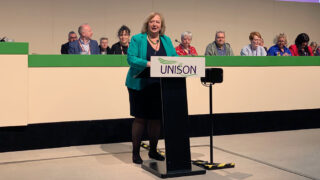UNISON will “make sure the fight for our lowest-paid members underpins everything we do”. That was the message from the union’s head of health Christina McAnea’, as she set out the key principle of the union’s pay strategy at the health conference in Brighton yesterday.
Reaffirming the union’s commitment to Agenda for Change, while recognising that pay had become a devolved matter, she noted that it could be devolved to country only, not region.
And reporting that health workers in Northern Ireland currently have the lowest pay rates in UK, Ms McAnea added that this will be the union’s next target.
Gordon McKay told delegates that, in Scotland, the union had made significant gains. Agreement has been reached that there will be no compulsory redundancies and, from 1 October, band 1 and the first two paypoints in band 2 will be abolished.
This will mean that the lowest-paid health worker in Scotland will earn £1,700 a year more than lowest-paid in rest of UK.
“£33 a week makes a real difference in people’s lives,” said Mr McKay. But he also emphasised the need for cross-country working:
“A Scotland-only agreement isn’t good enough – we will support our colleagues in the UK.”
For Cymru/Wales, Mike Jones said that “the four countries working together need to ensure equality and parity on pay.”
Ms McAnea reassured delegates that the union would continue to focus resources on areas where pay was being attacked locally, recalling campaigns where UNISON had defeated such attempts, including the South West pay cartel a couple of years ago, when the union had prevented a group of trusts’ attempts to impose local pay.
“We will be ready for any attacks on our terms and conditions,” she said, “and I mean any terms and conditions – not just unsocial hours.”
Conference agreed to challenge the government’s 1% pay cap and to aim to lift NHS pay across the four countries.
Deputy head of health Sara Gorton spoke on talks to take place on refreshing Agenda for Change, an “important step on the way to improvement.”
The union aims:
- to restructure bands 1-3, removing poverty pay from the NHS;
- to raise starting salaries; and
- to shorten paybands and reduce the time it takes staff to get the ‘full rate’ for the job.
“This is not going to be easy,” said Ms Gorton, “and it will not be of value if it improves pay at the expense of terms and conditions.”
The union’s most radical area for discussion is around the real living wage, she said: “restructuring bands 1 to 3 cannot be done at the expense of bands 4 to 9.”
But the talks represent “a great chance to talk to members about what we can achieve for them. That even in these difficult times we are a union that can work to improve their conditions.”
Healthcare support worker Karen Berk spoke up in favour of the talks. She recalled that, when she started work 25 years, ago the pay was very poor.
“I was working between 50 and 60 hours a week to have a reasonable standard of living. But when you work those type of hours you pay the price. I missed out on family life, Christmases, bank holidays, sports days. And many low-paid workers were doing exactly the same.
“Then Agenda for Change came along, and lifted me from band 2 to band 3.
“I still firmly believe in Agenda for Change: yes it’s not perfect, but it’s the best we have. Let’s make it better.”





